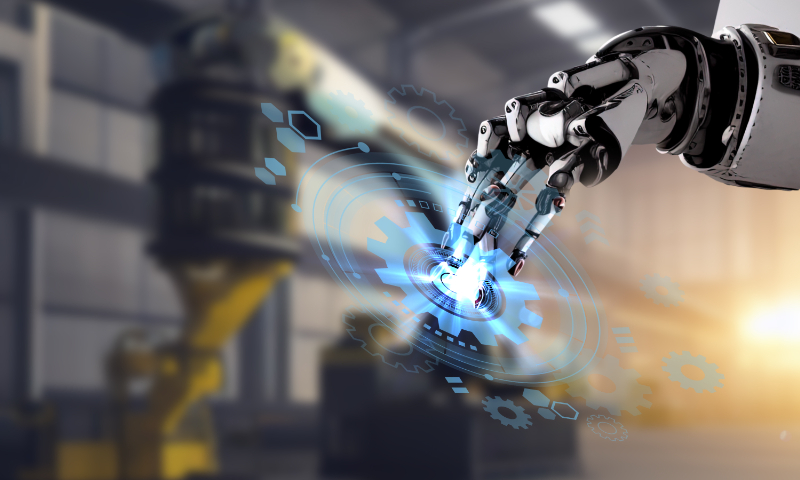
An intelligent robotic arm Photo: VCG
Developing new quality productive forces has become a major theme in China's policymaking since it was first put forward by Chinese President Xi Jinping in September 2023. It is also listed as a priority for this year's economic tasks outlined in the Government Work Report delivered to the ongoing two sessions in Beijing.
"China will strive to modernize the industrial system and develop new quality productive forces at a faster pace this year," noted the report, which placed sci-tech innovation high on the government's agenda.
The national lawmakers and political advisers have expressed full confidence on the prospects of China's sci-tech advance and economic development, saying that the rapid development of strategic emerging industries such as artificial intelligence (AI), quantum computing and new green energies will shore up sustainable momentum to support the high-quality development of Chinese economy.
Xi, also general secretary of the Communist Party of China (CPC) Central Committee and chairman of the Central Military Commission, on Tuesday stressed developing new quality productive forces in China in accordance with local conditions during the second session of the 14th National People's Congress (NPC), the Xinhua News Agency reported.
President Xi called for focusing on high-quality development as the top priority, urging efforts to step up innovation, foster emerging industries, adopt forward-thinking plans for developing future-oriented industries and improve the modernized industrial system.
New growth driversThe term - new quality productive forces - emerges from continuous breakthroughs in science and technology, which will drive the development of strategic emerging industries that may bring disruptive technological advances in the era of intelligent information.
Developing new quality productive forces is a decisive step in the economy's high-quality development course, Guo Guoping, an NPC deputy and a vice director of the Key Laboratory of Quantum Information of the Chinese Academy of Sciences, told the Global Times.
"The concept offers guidance for our country to take advantage of the historical opportunity of a new round of technological upgrade and aims to develop strategic emerging industries and future industries," Guo said, noting it is of great importance for China to implement innovation-driven development strategy, seize the high ground in global industrial competition and build up China's manufacturing edge.
Currently, the development of new quality productive forces in China is picking up pace.
Official data showed that China's output of new-energy vehicles reached 9.44 million in 2023, up 30.3 percent on a yearly basis, while the output of solar panels rose by 54 percent to reach 540 million kilowatts. Last year, the country's production of service robots reached 7.83 million sets, up 23.3 percent year-on-year.
The development of new quality productive forces has great potential in China, as its huge market place ensures full testing, application and evolution of new technologies and new business models, Xu Jiuping, a professor of Sichuan University and a member of the National Committee of the 14th Chinese People's Political Consultative Conference (CPPCC), told the Global Times.
Xu advocated that enterprises, with the support of national innovation policies, make full use of the market demand to help China's manufacturing sector overcome shortcoming and boost the development of new quality productive forces in China.
AI Plus initiativeIn recent years, the economic growth in the world was mainly driven by new technologies, which would give birth to new industries and then form new productivity. In order to promote the development of new quality productive forces in China, analysts said the country should firmly adhere to deepening scientific research and technological innovation.
China is now beefing up support for building new manufacturing lines that are integrated with advanced tech breakthroughs such as AI, quantum computing and new and green energies. China ranked 12th place in the 2023 Global Innovation Index, and became the country with the largest number of top 100 sci-tech innovation clusters in the world for the first time, according to the latest ranking by the World Intellectual Property Organization.
It's projected that global AI competition will become a systemic contest in 2024, which will also be a crucial year for China and the US to compete in the in-depth application of generative AI breakthroughs said Liu Qingfeng, chairman of Chinese artificial intelligence company iFlytek who is also a deputy to the NPC.
Liu suggested that China should accelerate technological advances in key sectors including neural science, brain-like intelligence innovation, and quantum computing so as to achieve an overtaking on the curve.
Yang Jie, chairman of China Mobile and also a member of the National Committee of the CPPCC, suggested that the country boosts an AI Plus initiative in the national level by strengthening top-level design and clarifying development goals and key tasks, in order to fully give play to the huge potential of AI in achieving leapfrog development of technologies, industrial upgrade and productivity.
Comprised of AI and the manufacturing sector, smart manufacturing is an important part of forming new quality productive forces. However, China's smart manufacturing faces three major problems: Supply capability need to be strengthened, application needs to be promoted, and a standard system needs to be established, said Zhong Zheng, an NPC deputy and vice president of Midea Group.
She suggested that the country support leading companies in various industries to take the lead in developing industrial solutions so as to help more companies set up world-leading smart factories.
While putting focus on emerging and future industries, Chinese analysts said the country should aggregate high-level innovation talent to foster the whole chain of innovation. In addition to independently nurturing high-level talent, the country should also deepen reforms in talent introduction channels and set up a new mechanism to attract talent from all over the globe.




